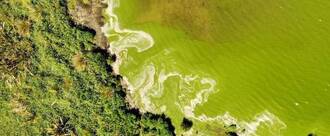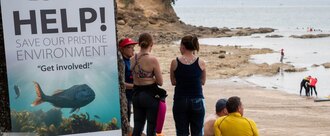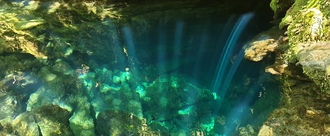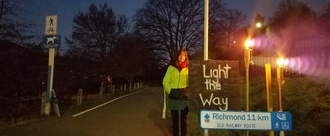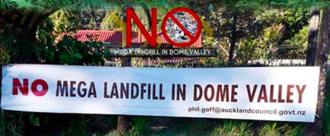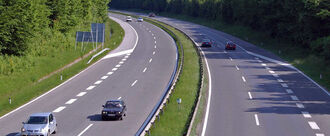-
Restore all the Queen Elizabeth Park wetlandsThe protection of the Queen Elizabeth Park area is so important to the Wellington region for environmental, recreational, social and climate change reasons. Now we have the opportunity to increase the area of the protected environment and restore the wetlands. The Wellington region has less than 3 percent of its original wetlands left. Drained and farmed peat emits huge amounts of carbon dioxide whereas rewetted peat will become a carbon sink so this action is consistent with GWRC declaring a climate change emergency. It also reduces the need for chemical weed control as woody weeds such as gorse and blackberry cannot survive in wet earth. Natural spaces in urban environments offer huge benefits to community well-being not to mention native flora and fauna. By expanding the protected area we could set a precedent for the rest of the country to show what is possible. It could also become a significant education tool. We've had some wins to protect what still exists, but we can do more! Add your name today and be part of this joint submission to show the public support to protect this special area. See our previous petition at https://our.actionstation.org.nz/petitions/save-the-raumati-wetlands-in-queen-elizabeth-park-and-create-kapiti-s-biggest-carbon-sink Greater Wellington Parks Network Plan: http://www.gw.govt.nz/parks-network-plan746 of 800 SignaturesCreated by Friends of Queen Elizabeth Park

-
Halve food waste by 2030Did you know that a third of the food we produce is lost or wasted from farm to fork? Tackling food waste could lead to a triple win for New Zealand: 1. Environmentally: Reducing carbon emissions and protecting the environment. 2. Economically: Boosting the economy and saving Kiwis money. 3. Socially: Improving livelihoods and increasing food security. New Zealand does not currently have a national food waste reduction target. We are lagging behind countries representing 50% of the world’s population, including Australia, the United States and the United Kingdom. This needs to change. We need to take steps to align ourselves with the global target, Sustainable Development Goal Target 12.3 (SDG 12.3), to halve food waste by 2030. Reducing food waste has recently been ranked as the third best global solution to addressing climate change (Project Drawdown). New Zealand has an opportunity to lead the world in climate action, sustainable food production, and preventing food from being wasted. We are calling on any newly elected Government to set a food waste reduction target in their 100 day plan (or coalition agreements) and align with SDG 12.3. This is our chance to set the right direction on reducing food waste over the next 10 years. Once government sets the direction, we believe businesses will come on board. We’re starting to see this globally, with two thirds of the world’s largest food businesses having adopted SDG 12.3. On top of this, many food businesses are measuring their food waste and taking action to reduce it. We encourage this target-measure-act approach for New Zealand businesses too. Setting national food waste targets can create widespread change, across government, businesses and the community. The time is ripe to start tackling food waste and ensuring that we have sustainable and secure food systems. WHO SUPPORTS THIS PETITION? This petition is supported by New Zealand Food Waste Champions 12.3, a coalition from New Zealand’s food supply chain to accelerate progress towards achieving Sustainable Development Goal Target 12.3 (SDG 12.3). Our twelve Champions work in retail, food businesses, research institutions and food waste reduction not-for-profits. Champions' organisations that back the petition include: KiwiHarvest, EcoStock, Countdown, NZ Food Network, Kaibosh, Leftfield Innovation Ltd, EcoGas, Bioresource Processing Alliance, Everybody Eats, Sustainable Business Network and our sponsor, Countdown. This petition is also supported by our Citizens of 12.3 – everyday Kiwis who want climate action on food waste. The Sustainable Development Goal Target 12.3 in full is: “By 2030, halving per capita global food waste at the retail and consumer levels and reducing food losses along production and supply chains, including post-harvest losses”. Other supporters include: FoodTruths, FoodPrint, United Nations Association NZ, Dietitians NZ, United Fresh NZ INcorporated, Potatoes NZ, The Carbon Cycle Company, Taco Addicts, CompostMe and Wilding & Co, Toha, Beef + Lamb, Powered by Plants NZ Ltd, Sustainability Trust, The Rubbish Trip, Skinny Fizz, WELLfed, Generation Zero, Zero Waste Network, WWF and Greenpeace.1,234 of 2,000 SignaturesCreated by NZ Food Waste Champions

-
Provide water fountains in all public places“One of the worst days in my dental career was when I had to remove 10 teeth in one surgical procedure from an 18 month-old baby, still in nappies,” says Dr Beaglehole. (Principal dental officer at Nelson Marlborough Health). Lack of access to public drinking fountains and prominent marketing of sugary drinks create an environment where it’s often easier to find somewhere to buy bottled drinks than find a drinking fountain, increasing the consumption of sugary drinks and bottled water and with it increased obesity, dental decay and plastic pollution which is killing our marine life. Its hard to imagine but last year 8,700 children in NZ had to be hospitalised to have their teeth removed, due to dental decay and the main reason is sugary drinks. Sugary drinks are also a big contributor to our high rates of obesity and obesity is a recognised risk factor for severe clinical outcomes of COVID-19, and obese people are nearly 50% more likely to die from Covid 19.* A recently released UNICEF report, found that New Zealand has the second highest obesity rate in the OECD. More than one in three children are overweight or obese, with Pasifika (66.5%) and Māori (48.2%) children facing the highest risk . We are also seeing a rise in Type-2 diabetes in children we huge long term health risks. This could be avoided with better access to free tap water when people are out –by councils putting in more public drinking fountains. Currently there is only one drinking fountain for every 3,135 people and as few as one fountain for every 17,000 people in the worst-affected area. Paying for bottled drinks on the go, when good quality tap water should be readily available free-of-charge via drinking fountains, is an unnecessary expense for Kiwi families, especially with the economic impact of COVID-19 With the recent establishment of Taumata Arowai, the new Crown Entity to regulate water, there is an opportunity for central government to act urgently to make tap water the first and most convenient choice for New Zealanders. “Taumata Arowai’s objectives and functions includes protecting and promoting water-related public health outcomes. So we’re calling on government to act and make drinking fountains compulsory in half of all public parks, sports fields, and playgrounds.” SIGN NOW as we have a unique chance for new legislation to be introduced when the new government comes in. 👎 Councils have neglected to provide access to public drinking fountains where they are needed. 👎 With an average of just one drinking fountain for every 3,303 people and as few as one fountain for every 17,000 people in the worst-affected areas. 👎 As few as one in five children’s playgrounds, and less than one in 10 parks, have water fountains.* 👎👎 Data shows low-income communities often have fewer public drinking fountains per person than more economically affluent areas, reducing choice and affecting Māori and Pasifika health outcomes. ⚠ Kiwis consume up to six times the recommended daily sugar intake, with 25 per cent coming from sugary drinks, one 600ml soft / sports drink contains up to 16 teaspoons of sugar – more than five times the World Health Organisation’s recommended daily intake of sugar for a child, in one hit. ⚠ Contributing to our high rates of obesity, with than one in three children overweight or obese. (UNICEF) ⚠ In 2019, the number one reason why Kiwi kids were admitted to a New Zealand hospital was to have their teeth removed under general anaesthetic. https://www.stuff.co.nz/national/health/111956057/appalling-child-tooth-decay-rates-in-northland-and-auckland ⚠An international team of researchers found that people with obesity who contracted COVID-19 were: • 113% more likely than people of healthy weight to be admitted to hospital, • 74% more likely to require treatment in ICU, and • 48% more likely to die. *https://www.sciencemag.org/news/2020/09/why-covid-19-more-deadly-people-obesity-even-if-theyre-young 👎 Single-use plastic bottles are also a major contributor to plastic pollution on our beaches and waterways, killing our marine and bird life. In Aotearoa, we throw away an estimated 838 million plastic bottles every year - the equivalent of 165 Olympic swimming pools. 👍 Councils are the ones legally responsible for providing clean drinking water and need to increase their level of investment in public drinking fountains. 👍 Improving drinking fountain provision in low-decile areas, on sports grounds, and in parks and children’s playgrounds can help reduce the consumption of bottled drinks and help fight sugar-related health issues and single-use plastic waste. SIGN NOW as we have a unique chance for new legislation to be introduced.377 of 400 SignaturesCreated by Jill Ford
-
Pledge to use our votes for Climate Justice in the 2020 ElectionThe stakes for the 2020 election have never been higher: the action we do or don't take on climate change in the next ten years, and in this election cycle, will determine the future we are passing on to the next generation. We are inviting all people in Aotearoa New Zealand to pledge to use your vote for climate justice in the 2020 election. During COVID-19, our team of five million demonstrated overwhelming kindness, compassion and support for one another. We came together to get New Zealand into one of the best positions globally in relation to COVID-19. This is one just step. As we recover, we must ensure we are doing the same to use the opportunity to show other countries how a green recovery can be done, with climate justice at the centre. 🌏🌏🌏 This is the perfect opportunity to centre a just transition for all which is aligned to Te Tiriti ō Waitangi. When we say climate justice, we mean indigenous justice, disability justice, social justice and all other facets of justice - a just transition, with no one left behind. We can build better by recognising the intersectionality of the issues and challenges we face and make progress across the board. 🌏🌏🌏 This planet that we share is facing its own pandemic, suffocated by 100 corporations contributing 70% of global emissions and by political leaders who simply aren’t doing enough. We need to stand up for Papatūānuku, our Earth Mother, now more than ever. 🌏🌏🌏 Let’s take this moment to co-create a new ‘normal’ which puts this planet that we all share to thrive. Our elected representatives listened to the science on COVID-19, now it’s time for them to do the same with climate change. The climate crisis threatens people, nature, and everything we care about. The crisis calls on us to re-organise our economies and relationship to the planet and each other. Whether it’s the health system, our jobs and income, our local beaches, our favourite patch of native forest, our communities, or our mental health – we won’t go back to business as usual. By voting for better climate change policy means we will be voting for everything and everybody we care about to have a better future. 🌏🌏🌏 Many of the policies we need will have co-benefits for other environmental and social issues. Some of these benefits include: improving health and economic outcomes with less cars and more active transport, food sovereignty from growing and buying more nutritional, mostly plant-based produce locally, and decentralising power and energy supply, leading to savings for communities. By decarbonising our economy, we will create more time for doing the things we love, with the people we love, in the nature we love. It will mean working less and sharing more. Driving less and cycling more. Polluting less and planting more. Overall, climate change policies will make our society more resilient as they intersect with every aspect of our lives. 🌏🌏🌏 Make the pledge now! In the 10 weeks leading up to polling day, Vote Climate is holding events across the country to encourage New Zealanders to vote climate. Events, spread across cities and regions, encompass everything from rallies to cross-party climate debates. The campaign aims to inspire voters to find more about their parties and candidates' stance on climate change, and push every party to provide a comprehensive climate action plan that aims to keep us below 1.5 degrees of warming by halving our greenhouse gas emissions. Head over to the Vote Climate 2020 Facebook Page to check out the different events happening each Friday https://www.facebook.com/pg/voteclimate2020nz/events/169 of 200 SignaturesCreated by Vote Climate 2020
-
Don't Exclude Lake Horowhenua From Freshwater PolicyLake Horowhenua near Levin is a taonga. Despite it's awful treatment over decades - sewage, stormwater and other run off from the land pouring into its water- this is a place we treasure and have long wished to clean up. The Government is introducing new new rules for the protection of freshwater in our streams, awa (rivers) and roto (lakes). There are some really good things in the new rules, for example caps on the use of synthetic fertiliser. They also put in place greater protection measures for wetlands, as well controls on the soil and sediment allowed to enter waterways.[1] However, we are deeply concerned that you, as Minister for the Environment, are considering leaving Lake Horowhenua out of the new rules, which would allow the lake to be polluted even further. It is clear you consider it 'too hard' to protect the health of the Lake - despite the water being so toxic that a Niwa scientist said in 2012 a small child could die if enough was swallowed. [2] The suggestion that the Horowhenua and Pukekohe be exempted because they grow 30% of our vegetables isn’t a good enough reason, when a change in farming practices, away from overuse of fertilisers etc., could address this (and is important for our overall environmental sustainability.) In fact, we are deeply distressed and angered that there have been talks to allow this type of unsustainable farming to continue - especially as we face worsening climate change. Lake Horowhenua deserves all the care of other lakes. The Waitangi Tribunal found in 2017 the Crown had breached Te Tiriti o Waitangi by being complicit in the pollution and environmental degradation of the lake and for you to exclude it would breach the Treaty further. It is a terrible precedent to set that when a lake has been polluted then we can just forget about it, let it become a dump.This is a slippery slope that we urge you not to go down. Instead, we ask that you put your full weight behind measures to clean up Lake Horowhenua and the region’s other waterways, and to progress more sustainable farming measures in both named regions. Iwi and local communities would then be able to swim in the lake and rivers again, and local farmers would be supported for meeting the best standards for healthy and sustainable practices. We are asking you as Minister for the Environment not to exclude Lake Horowhenua from your National Policy Statement for Freshwater Management, due to be finalised this year. The questions raised by your intended actions: Why would the Minister decide this when the lake is treasured? Why, when no one, including hapū and iwi, were properly consulted? Why when there is more money than ever available for storm and wastewater systems and "jobs for nature" from Government in the Covid-19 budget? Why when we know we can do better, that even in our horticultural operations that use what they call "luxury N" - extra nitrogen that is not necessary for growing vegetables but just makes veges look extra green when they hit the shelves - can and should reduce their impact, without risking our supply of veges. Why would the Minister do this when he knows our land can (and should for its own health) put in place better soil conservation methods - his Ministry has just done work on protecting productive land. Why would the Minister exempt any waterway when the freshwater policy does not even put a deadline on reaching bottom lines? Why would the Government okay this when at the same time it is spending millions on "cleaning up" the same lake? Please, Minister Parker, we ask that you immediately include the two exempted regions (Horowhenua and Pukekohe) in the National Policy Statement for Freshwater Management, and consult with local iwi and communities to clean up the lake and insist on more sustainable farming practices in the region. Join us in calling for Lake Horowhenua to be included in the National Policy Statement for Freshwater Management, along with the waterways and aquifers of Pukekohe. References 1. Lake Horowhenua pollution exemption will not help restoration efforts, iwi says, Stuff, July 2020 https://www.stuff.co.nz/environment/300056712/lake-horowhenua-pollution-exemption-will-not-help-restoration-efforts-iwi-says 2. Lake Horowhenua toxic enough to kill a child, Stuff, 2012 http://www.stuff.co.nz/environment/6390665/Lake-Horowhenua-toxic-enough-to-kill-a-child Why? When the lake is treasured. https://www.stuff.co.nz/environment/118169959/where-we-used-to-swim-lake-horowhenuas-health-a-testament-to-peoplemade-pollution Why? When no one, including hapū and iwi, were consulted. https://www.stuff.co.nz/environment/300056712/lake-horowhenua-pollution-exemption-will-not-help-restoration-efforts-iwi-says Why? When there is more money available for storm and wastewater systems from your Government. https://www.stuff.co.nz/environment/122062256/new-fund-will-pave-way-for-multibillion-dollar-overhaul-of-water-sector Why? When we know we can do better, even in our horticultural operations that use "luxury N" - extra nitrogen that is not necessary for growing vegetables but just makes veges look extra green when they hit the shelves. Why? When our land can (and should for its own health) put in place better soil conservation methods. https://www.nzherald.co.nz/nz/news/article.cfm?c_id=1&objectid=12035548 Why? When the policy does not put a deadline on reaching bottom lines. https://www.mfe.govt.nz/action-for-healthy-waterways Why? When you are spending millions on "cleaning up" the same lake! https://www.nzherald.co.nz/water/news/article.cfm?c_id=362&objectid=12346368 On breaching the Treaty https://www.stuff.co.nz/national/94246816/crown-left-horowhenuas-muaupoko-iwi-virtually-landless-breaching-treaty-of-waitangi?rm=m1,554 of 2,000 SignaturesCreated by Mandy Hager
-
Incentivise NZ farmers to diversify for longevitySupporting our farmers to diversify into cropping and horticulture is going to be good for everyone, as well as good for the planet. What is needed are financial incentives, retraining opportunities and help in finding the right crop to grow on the land. Many of our businesses would love to be 100% Kiwi sourced, but due to being unable to buy the required plant proteins in enough quantity here in NZ, they are sourcing abroad. Kiwi farmers don't want to be left behind in the global market. The export potential for our horticulture products is huge too. We have everything to gain by transitioning to a more balanced and sustainable economy. According to an Otago University paper a wholefoods plant diet could bring carbon emissions savings of up to 42%, confer a population gain of up to 1.5 million quality-adjusted life-years, and save our health care system up to $20 billion. The nation's health and wellbeing depend on our ability to be sustainable and self-sufficient, but our farmers can only do the right thing if they are supported to do so. Government funded think tanks could help an individual farmer choose the best crop(s) for their land, work out how much land can be used for horticultural purposes and help direct a timeline for transition. Let's make this really easy. 🌱 Our Green Protein Report provides suggestions for how we can reduce emissions, detailed reasons why this needs to happen and the benefits to our society by doing so. Copies are available on request and a PDF is available for download here: https://vegansociety.org.nz/wp-content/uploads/2021/03/Green-Protein-Revolution-Report-2020-2.pdf This petition is supported by 🌏 A Guide to Vegan 🌏 Animals Aotearoa 🌏 Better Futures Forum 🌏 Deavoll Construction Limited 🌏 Evidence Based Eating 🌏 Fitness Locker 🌏 Greenpeace NZ 🌏 Kaiaroha Vegan Deli and Eatery 🌏 Lorax Group Limited 🌏 Mylk Made 🌏 New Zealand Anti Vivisection Society 🌏 New Zealand Vegetarian Society 🌏 Plant Based NZ Health Trust 🌏 SAFE 🌏 Tanglewood Foundation 🌏 The Lentil Intervention 🌏 The Plant Based Treaty 🌏 Ulenberg Eco-Architects Ltd 🌏 V & V 🌏 Vegan Society Aotearoa 🌏Vice Cream Limited 🌏 Welligton Vegan Actions2,105 of 3,000 SignaturesCreated by Vegan Society

-
Save Auckland's Marine Reserves and WaterwaysYour support is urgently required as the Auckland Council will soon make decisions to cut funding for programmes that are designed to improve sediment and contaminant control in our waterways. A Sediment Programme is vital for our marine reserves and coastal waterways, however, the Chief Planning Office advises the planned Sediment Programme may be reduced due to a lack of budget. The Auckland Council Emergency Budget proposes reducing the programmes of the Healthy Waters Department and the Chief Planning Office. The budget cut will jeopardise Council’s ability to meet and support its obligations required by the National Policy Statement for Freshwater Management (NPSFM), as it will negatively affect the Council’s ability to manage how much sediment and pollution is released into the Hauraki Gulf. This will affect the programme’s next step to improve sediment controls on large-scale greenfield developments and improve transparency between compliance performance and iwi / community expectations of water quality. This will have devastating consequences on the health of the Long Bay Okura Marine Reserve and other important estuaries and waterways around the Auckland Region, that are affected by the sediment from coastal development. Your support is urgently required as the Auckland Council will soon make decisions to cut funding for programmes that are designed to improve sediment and contaminant control in our waterways. The future of our waterways depends on action, please sign this petition to show your support. State of the Gulf: Auckland Council report finds estuaries choking in sediment, shellfish dying, June 2020 https://www.nzherald.co.nz/nz/news/article.cfm?c_id=1&objectid=12342221&fbclid=IwAR3yYpTDHB8QKcaqk2G2vrtEDDtvDGb3sBBYVlWEEXNp9szNuYBk05DF_lg568 of 600 SignaturesCreated by Teresa Moore
-
BAN LANDFILLS NEAR WATERWAYSWe believe that water is the most precious resource our country has and that landfills pose a significant threat to our water quality. We believe there are alternative locations and technologies. Waste buried in landfills can include plastics and potentially hazardous and toxic materials which could devastate waterways, rivers and harbours, the animals that inhabit them, and the people that rely on them. Would you drink water from an aquifer under a landfill or eat fish from a contaminated harbour? Protect our water from landfills. This petition will be used as part of a presentation to be made in front of the Environment Select Committee to ban landfills near waterways in New Zealand. This is part of a campaign by Fight the Tip, Tiaki te Whenua Incorporated. Join our group: https://www.facebook.com/groups/SavetheDome/395 of 400 SignaturesCreated by Michelle Carmichael
-
Light the Way 2020 (Railway Reserve, Nelson)We believe that this thoroughfare is a vital part of the Nelson commuter network for cyclists, pedestrians and skateboarders, as well as a very popular local route for Nelson south residents, dog walkers and runners. Long distance cyclists typically use this route also. By lighting the way we hope this route will become safer and more appealing for movement outside of daylight hours, particularly in the winter, giving us more choice to move around our city without motor vehicles, and to recreate more safely in our local neighbourhood.212 of 300 SignaturesCreated by Ange Palmer
-
Cancel RIMPAC 2024: New Zealand withdraw!We are living through a time of tremendous change, when ensuring a healthy and peaceful world is paramount. No complicity with Israel's Genocide in Gaza: 38,000+ Palestinians are dead from an ongoing genocide in Gaza. The International Court of Justice (ICJ) has said Israel must immediately cease its activities. The International Criminal Court has asked for arrest warrants for Israeli Prime Minister Benjamin Netanyahu and Defence Minister Yoav Gallant. The ICJ told Israel to halt its military operation in the southern Gaza city of Rafah. Instead, Israel intensified the bombing of civilians setting people on fire in a grotesque massacre. The United Nations added Israel to its ‘blacklist’ of countries that commit grave violations against children during armed conflict. Aotearoa NZ must do everything to isolate Israel, and that means refusing to train with their military. Decolonisation of the Pacific: The foundation of that peaceful and just world is built upon real decolonisation of the Pacific. We believe the Pacific should be free and independent. RIMPAC directly stands in the way of decolonisation. It is held on occupied Indigenous land in and around Hawai'i, a place that was stolen and illegally annexed by the US to be used for sugar plantations and giant military base for Pacific operations. Many Kanaka Ma’oli, or Indigenous Hawai’ians, demand a return of their stolen lands and the rightful recognition of their legitimate authority over the islands. Dozens of navies, invited by the US military, descend on Hawai’i and the Pacific to bomb, to shoot, to explode and to pollute Indigenous territories. It is an invasion. RIMPAC is just one of many military training exercises conducted by the US military in the region. Nuclear-free and weapons-free Pacific: Now is a time when active demilitarisation of the Pacific should be occurring and held as the standard, to create a healthy and peaceful future, where relationships between all peoples of the region flourish. As the People’s Charter for a Nuclear Free and Independent Pacific stated in 1983, the Pacific “environment continues to be despoiled by foreign powers developing nuclear weapons for a strategy of warfare that has no winners, no liberators and imperils the survival of all humankind.” The New Zealand armed forces will be playing “realistic” war games again alongside the armed forces of four nuclear weapons states involved in RIMPAC 2024 - Britain, France, India and the USA - despite the 1987 NZ Nuclear Free Zone, Disarmament, and Arms Control Act prohibiting New Zealanders from aiding and abetting those possessing or having control of nuclear weapons. The devastating legacy of nuclear testing in the Pacific has caused much harm to generations of Indigenous Pasefika peoples. The nuclear powered RIMPAC war machine is unwelcome. Ecological restoration and regeneration: While communities across the Pacific work towards ecological restoration and protection of ecosystems and biodiversity, against the ravages of climate change and pollution, it is shocking and unacceptable that RIMPAC willfully adds to devastation. During RIMPAC, deadly weapons are used on land and sea causing massive environmental destruction to the Hawaiian Islands and the Pacific Ocean. The live fire training involves shelling islands; using bombs and missiles to sink ships, leaving ammunition, debris and wreckages in the sea; and detonating underwater explosives. The US Navy is exempt from the Marine Mammal Protection Act meaning it can test underwater sonar weapons that kill and injure whales, dolphins and other species. The US military is the world’s single largest user of oil - greater than some entire European states. These emissions are not even counted as part of the Paris agreement with all militaries exempt from counting or revealing their carbon footprint. The warships, fighter planes, troop transport, tanks and other vehicles used during RIMPAC consume vast amounts of fossil fuels, further fueling climate change and conflict. We have a responsibility to not be part of planning for a war in the Pacific that would only see untold human and ecosystem suffering and death. We call for an end to war exercises in the Pacific and for a demilitarised Pacific. New Zealand has the chance now to exercise independent foreign policy and be a Pacific partner and hold peace, stability, and respect for Pacific nations sovereignty by withdrawing from RIMPAC 2024. In 1982 New Zealand withdrew from RIMPAC activities. We can do it again. Join us in demanding that that New Zealand government #CancelRIMPAC 2024 - Sign this petition. This petition is led by the Cancel RIMPAC Aotearoa Coalition. References and more information: For information about the use of fossil fuels by the world’s militaries, visit Brown University’s Cost of War project: https://watson.brown.edu/costsofwar/papers/ClimateChangeandCostofWar The Spinoff: “Dear New Zealand, please don’t bring your war games to my Hawaiian home” https://thespinoff.co.nz/politics/10-06-2020/dear-new-zealand-please-dont-bring-your-war-games-to-my-hawaiian-home/ Te Ao News: “Activists want navy out of RIMPAC to avoid Covid-19 spread” https://www.teaomaori.news/activists-want-navy-out-rimpac-avoid-covid-19-spread Open Letter to Prime Minister Ardern in 2020: https://aucklandpeaceaction.wordpress.com/2020/04/08/cancelrimpac-open-letter-to-prime-minister-jacinda-ardern-say-no-to-rimpac-military-exercises/ https://www.rnz.co.nz/news/national/418720/rimpac-war-games-exercise-new-zealand-government-urged-to-withdraw https://wwea.podbean.com/e/interview-about-rimpac-with-dr-emalani-case/ See video made in 2020 (by coalition member Auckland Peace Action): https://www.youtube.com/watch?v=gxfquSMA5zk&feature=emb_imp_woyt4,286 of 5,000 SignaturesCreated by #CancelRIMPAC Aotearoa

-
No Dump in Dome Valley - Protect Kaipara MoanaThe current Dome Valley Landfill Application is focused on meeting the current needs of Auckland City Council’s waste requirements, without regard to Mana Whenua and our special relationship to the Whenua and local community It is the position of Ngāti Whātua that the landfill proposal in its current form will cause irreversible damage to Papatūānuku and pose significant ongoing risks to the sustainability and mauri of the Hoteo River, Kaipara Moana our whenua and the broader environment. We must consider the long-term environmental outcomes, and the first step for protecting the future of the Kaipara Moana is to consider sustainable waste solutions. We ask the Council to halt all discussions with Waste Management NZ and as a Treaty partner provide our Iwi the opportunity to co-create a partnership that will assist our communities to manage waste in a way that puts Papatūānuku and our community at the center of decision making. Ko au te Kaipara - Ko Kaipara Moana ko au Ngāti Whātua ask for national support for this kaupapa and are seeking tautoko/support from all Uri, whānau, hapū, marae and tribal partners to sign our national petition and put forward a submission which closes 11.59pm Tuesday 26th May. To make a submission and to learn more about the Iwi national campaign visit https://www.ngatiwhatua.iwi.nz/dome-valley Listen to locals share their concerns about the pending environmental disaster this proposed dump will bring to the community and the Kaipara Harbour https://www.youtube.com/watch?v=NYklFdyCW0I We acknowledge the efforts of Fight the Tip, Save the Dome who have been fostered strong community opposition https://www.facebook.com/FightWMSavethDome/ National Press Release - Council ignores their obligations to Mana Whenua https://www.scoop.co.nz/stories/AK2005/S00530/auckland-council-ignores-obligations-to-mana-whenua.htm4,588 of 5,000 SignaturesCreated by Te Rūnanga o Ngāti Whātua
-
Reclaiming Our Streets: Carless Days and Climate Change ResponsibilityCovid 19 Lockdown has given NZ society an opportunity to reflect on the value of living essentially. We have seen our streets and neighbourhoods become more connected and human friendly. We have seen what it is to live without the consistent noise and pollution of traffic and we, in the main, have found a measure of peace, connection and re-orientation in challenging times. This collective experience however is yet to translate to a collective conversation around our use of vehicles. This is an opportunity to reorient our streets and lives to focus on the essentials and clean up our air and our streets by giving them all regular periods of rest eg a return to carless days, car-pooling/sharing, a carless week/weekend each month and a clear reflection upon essential use of our own personal vehicles as well as those for commercial use. Each of us can then start to meet the need for climate change responsibility. Please sign for responsible use of vehicles and repurposing our streets for safe and enjoyable human usage. This is an outreach to local and central government. Please see below for articles on this idea: https://www.unenvironment.org/news-and-stories/story/world-car-free-day-22-september-great-opportunity-reduce-air-pollution and: https://www.weforum.org/agenda/2018/08/air-pollution-opportunity-not-just-problem/43 of 100 SignaturesCreated by Michael Owen



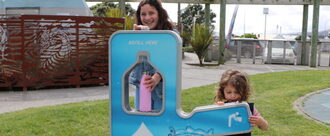
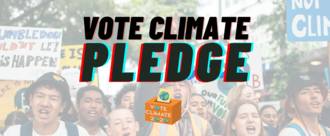.png)
